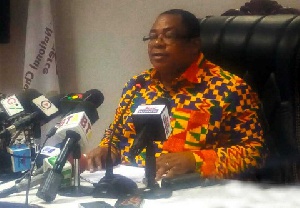 Dr. Appiagyei Dankawoso, President of the Ghana National Chamber of Commerce and Industry (GNCCI)
Dr. Appiagyei Dankawoso, President of the Ghana National Chamber of Commerce and Industry (GNCCI)
The Ghana National Chamber of Commerce and Industry (GNCCI) has lauded some key interventions by government to improve the economy and boost the business environment for private sector growth.
The Chamber particularly lauded the efforts to reduce interest rates, and electricity tariffs, suspension of import VAT and ‘fumigation levy’, peace and stability, and improvements in the trade balance.
Speaking at a press briefing at the Chamber’s office on Thursday, Nana Dr. Appiagyei Dankawoso, President of the GNCCI, said in light of the fact that access to cheap credit was fundamental to the growth and development of businesses, especially start-ups and SMEs, the reduction of the monetary policy rate by 200 basis points to 18 percent, by the Bank of Ghana, was commendable.
He however, noted that the private sector was concerned about the lagged effect of the reduction on interest rates in the banking sector, saying Ghana had the highest bank lending rates in Africa, at 35.5 percent, compelling businesses to access short-term credit with high interest rates for their long-term investments.
“We cannot continue to undermine the competitiveness of these businesses and eroding their profits with high interest rates,” he stated, adding that the coming into effect of the Ghana Reference rate in April 2018 should help address the persistent high sticky interest rates.
Nana Dankawoso I also noted that the reduction in electricity tariffs, effective April 1, will ease the cost of doing business and also bring relief to Ghanaians.
He said the suspension of import Value Added Tax (VAT) on 64 commodity groups including agricultural tractors, outboard motors, day-old chicks and mobile phones, among others, and the fumigation levy, will also reduce costs of doing business at the port.
He called on government to diversify Ghana’s economy in order to sustain the gains made in the country’s trade balance, which recorded a surplus of $545.5 million in February 2018, and to address the perennial depreciation of the cedi against major currencies.
He also lauded government, security services and other stakeholders for their role in protecting the peace and maintaining the security of Ghana, noting that this was an important reason for the modest economic and social progress that Ghana enjoyed.
The GNCCI, he announced, was undertaking a project, in collaboration with the United Nations Economic Commission for Africa and the African Trade Policy Centre, following the signing of the African Union Free Trade Agreement, to enhance intra- African Trade.
The project on the theme “Enhancing the Capacity of the Business Community for Boosting Intra-African Trade” will seek to provide a platform for information sharing among stakeholders, promote the application of ECOWAS Common External Tariff and ECOWAS Trade Liberalisation Scheme (ETLS) through capacity building on the utilisation of the User’s Guide and ETLS.
It would also seek to increase the awareness of 30 members of the business community and member companies of each of the 15 national chambers of commerce in the ECOWAS region about the Continental Free Trade Area.